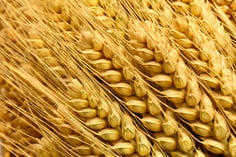Originally published : Wed, November 8, 2017 @ 1:29 PM
 Updated : Wed, November 22, 2017 @ 1:44 PM
Updated : Wed, November 22, 2017 @ 1:44 PM
Wheat is one of the three most important crops for human and livestock feed. With an ever-increasing global population, the pressure is on to increase cereal crop production as a solution to feed the world. It has been estimated that by 2030 demand on cereal production will increase by 50%. This means it is essential that scientists and breeders alike strive to maximise its growing potential.
Satisfying the growing global demand for wheat is thrown into difficulties by the crop's vulnerability to pests and disease. To combat these issues, scientists and wheat breeders are working to develop crops with improved key traits including:- Disease/pest resistance
- Abiotic stress resistance e.g. drought tolerance, heat tolerance
- Increased yields
- Better crop quality
SNP Genotyping for Wheat Improvement - Disease Resistance
Marker assisted selection (MAS) is one method being used to meet the challenge of developing disease-resistant wheat crops . MAS is a process whereby a marker (morphological, biochemical or one based on DNA/RNA variation) can be tracked through populations and used for indirect selection of genetic determinants of these key traits. This technique has a long history of successful use by academic laboratories, genotyping service providers and breeding companies in both plant and animal breeding.
A crucial step in the successful application of MAS in wheat breeding programmes has been the development of cheap and easy to use molecular markers, such as single-nucleotide polymorphisms (SNPs). A collection of quantitative trait loci (QTL) related to yield, quality and disease resistance, identified in wheat, have been converted into KASP SNP assays by way of KASP genotyping chemistry by the scientific community.
One example is leaf rust, a fungal disease caused by the pathogen Puccinia triticina. This leaf rust pathogen is known to have dramatic effects on the production of wheat crops in the Indian sub-continent. A recent publication by Chandra et al, shows how steps are being taken to identify new SNPs resistance to this devastating disease. The authors identified 77 new KASP markers for resistance to seedling leaf rust resistance in cultivar HD2329+Lr28. KASP markers, designed from unique SNP sequences identified by next-generation transcriptome sequencing data, were tested on 47 wheat varieties containing a variety of resistance genes to both powdery mildew and rusts including pathogen 77-5.
This exciting paper outlines pipelines for the identification of potential new leaf rust resistance QTL’s from discovery to MAS. Through KASP genotyping options, efficient introgression of QTLs through MAS could help with continual adaptation of wheat against these devastating diseases and help to meet global demand.
Learn More
- Read the paper SNP discovery from next-generation transcriptome sequencing data and their validation using KASP assay in wheat (Triticum aestivum L.)
- Download our poster ‘Key Trait Screening on Global Wheat Accessions using KASP genotyping markers’, generated in collaboration with researchers from the University of Adelaide and Hartley Grove
- Watch our video series explaining how KASP works and take a tour of our genotyping lab
- LGC’s wheat genotyping results are available through our online Assay Search Tool, which also holds over 8000 pre-validated KASP SNP assays that breeders and scientists can use for the development of precision breeding. We hope that this resource will continue to be useful for the wheat breeding community and ultimately help them to improve yields more quickly to meet ever-increasing demand

